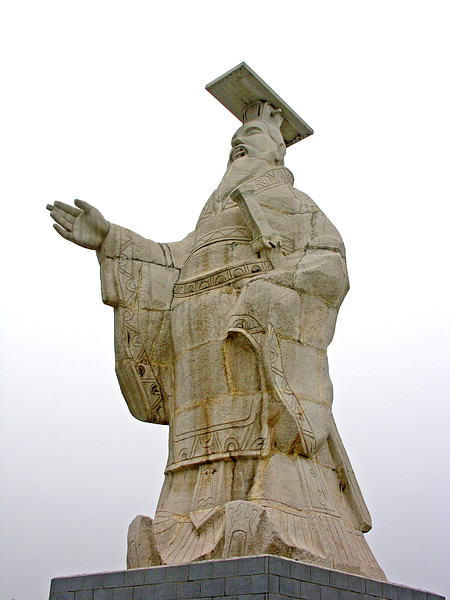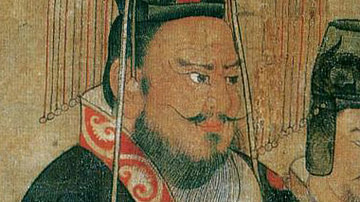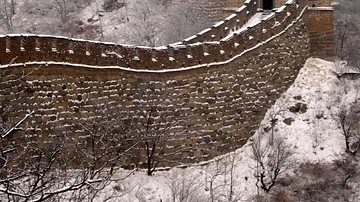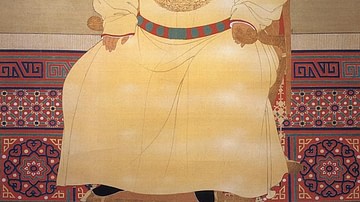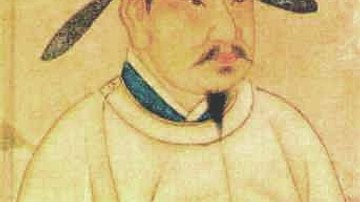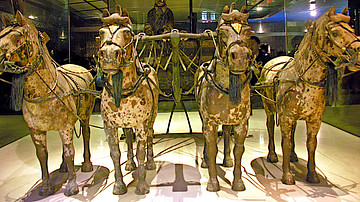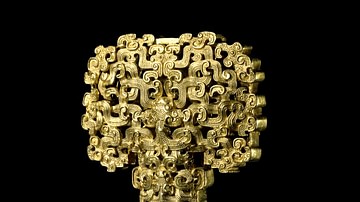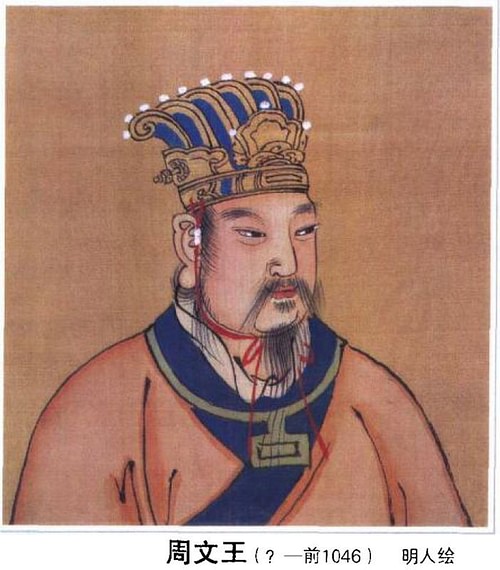
The Mandate of Heaven (Tianming), also known as Heaven's Mandate, was the divine source of authority and the right to rule of China's early kings and then emperors. The ancient god or divine force known as Heaven or Sky selected a particular individual to rule on its behalf on earth.
An important element of the Mandate of Heaven was that although a ruler was given great power, he also had a moral obligation to use it for the good of his people. If a ruler did not do this, then his state would suffer terrible disasters and he would lose the right to govern.
Wen & the Responsibility of Rule
The first Chinese ruler to claim his position and authority came directly from Heaven, which was for the Zhou the supreme divine force, was King Wen of Zhou, the pre-dynastic feudal state in the Wei river valley of China. Building on a well-established tradition of ancestor worship, this legendary king was known, as his successors would be too, as the 'Son of Heaven'. He was considered the head of the royal family, the nobility, the state, the judiciary and religious hierarchy. The idea of a divine favour on Wen was further endorsed by the conjunction of the five major planets in the night sky in 1059 BCE. When Wen and his successors died, it was thought that they rose to Heaven and served at court there. Such exalted attachments, then, ensured that subsequent rulers and emperors were treated with great reverence and awe by any person fortunate enough to ever come in physical contact with them.
Wen became a model for many subsequent kings, emperors, politicians and historians and a symbol of good and benevolent governance during his long and peaceful reign during the 11th century BCE. The virtue of his reign was in strong contrast to the debauched reputation gained by his predecessor King Chou. In later Confucian thought, Wen would be idealised and he was often cited by authors such as Mencius as the great example of a ruler whose every decision was based on the best interests of his people and who even shared his pleasure park with them. Mencius pointed out that "Heaven does not create people for the sake of the sovereign. Heaven made the sovereign for the sake of the people" (in Dawson, 8). The ruler must, therefore, at all times be guided by the principle of benevolence or jen. He is both the mother and father of the people. Further, if there were suitable omens such as floods and droughts and the ruler was proving less capable of fulfilling his mandate than he ought to have been, then Mencius considered it legitimate for the people, if not actually to overthrow their ruler and find a new one, then at least to show their disapproval through rebellion and protest.
A Ruler's Moral Obligation
Ancient Chinese historians would also later say that only because of the moral credit accrued by Wen's reign was it possible for his successor Wu Wang to finally conquer the Shang dynasty and establish the long-lasting Zhou dynasty. Indeed, the Duke of Zhou described the Mandate of Heaven along with its moral obligation to the conquered Shang people and so explained the reversal of their fortunes in the following terms in his Announcement of Shao:
Ah! August Heaven, High God, has changed his principal son and has revoked the Mandate of this great state of Shang. When a king receives the Mandate, without limit is the anxiety of it. Ah! How can he fail to be reverently careful!
Heaven has rejected and ended the Mandate of this great state of Shang. Thus, although Shang has many former wise kings in Heaven, when their successor kings and successor people undertook their Mandate, in the end wise and good men lived in misery…The king should have reverent care of his virtue.
Look at the former peoples of ancient times, the Xia. Heaven guided, indulged, and cherished them, so that they would strive to understand what Heaven favors, but by this time they have let their Mandate fall to the ground. Now look at the Shang; Heaven guided them, stayed near them, nourished them, so that they would strive to comprehend what Heaven favors; but now they have let their Mandate fall to the ground.
Now a young son succeeds to the throne; let him not, then, neglect the aged and experienced. Not only do they comprehend the virtue of our men of old - nay, more, they are sometimes able to comprehend counsels that come from Heaven.
Ah! Even though it be that the king is young, he is Heaven's principal son. Let him be grandly able to be in harmony with the little people. (in Ebrey, 21)
Just as both the Xia and Shang had lost their mandate through misrule and immoral conduct so, too, the Zhou rulers who followed Wen's reign, were acutely aware that if they did not perform their role with propriety then they too could lose the right to rule and, inevitably, they would be conquered by a rival and more virtuous state. The other side of the coin was that if they ruled well then they had a divine justification for their superiority over and conquest of the very same rival states, for they, through Wen, were the only inheritors of Heaven's Mandate.
The Evolution of the Mandate
Although the early rulers of the Qin state during the Warring States period claimed to have inherited the mantle of Heaven's representatives from the Zhou, later rulers such as China's first emperor Shi Huangdi (r. 221-210 BCE) of the Qin and the Han Emperor Gaozu (r. 202-195 BCE) were much less concerned with the moral aspect of their legitimacy as ruler. They were more inclined to consider their position was thanks to their military supremacy and fate. This was understandable as they had gained their right to rule by the conquest of rival states. Later thinkers such as the Neo-Confucianists Liu Zongyuan (d. 819 CE) and Zhu Xi (1130-1200 CE) went so far as to claim that the emperor was not an instrument of the divine at all but rather a necessary functionary of the natural order. Still, the concept of the Mandate of Heaven continued to be used as a useful legitimising argument for rule by emperors and even foreign conquerors of emperors right up to the 19th century CE.
In addition to the shifting position on just what the source of the authority of the emperor was, and despite his absolute power, he still could not do all that he wished. Such was the size of the state and its bureaucracy that he was reliant on advisors to keep him abreast of affairs and loyal supporters to carry out his policies within the framework of traditional government. As the historian R. Dawson here summarises,
Even the most autocratic emperor was inevitably restricted by traditions, conventions, and precedents, and by the pressures of relatives as well as by the need to rely on well-informed ministers. Although on occasion emperors could behave with sudden harshness, their right to act in an arbitrary manner served as a threat which was rarely put into practice. (15)
Limits on a Ruler's Power
Finally, although the emperor remained a hugely influential figure and retained such rights as awarding appointments and giving favours, punishments and pardons, his policies were also circumscribed by those of his predecessors, especially the founder of the dynasty who was viewed as being particularly favoured by Heaven. This was a catch to being the instrument of the divine. If all rulers were thus mandated, then their policies had to be respected. Consequently, even into the Ming Dynasty, a general policy of the founding emperor such as defending one's borders but not actively pursuing the enemy into their territory had to be considered and often respected. Thus, even the 'Son of Heaven' had, at least sometimes, to work within his limitations.
